
AIRCRAFT ENGINEERING AND AEROSPACE TECHNOLOGY
Scope & Guideline
Elevating aircraft engineering with cutting-edge insights.
Introduction
Aims and Scopes
- Aerodynamic Studies and Optimization:
Research on aerodynamic performance, drag reduction, and control strategies for various aircraft configurations, including UAVs and traditional aircraft. - Materials and Manufacturing Innovations:
Exploration of advanced materials, composites, and manufacturing techniques, emphasizing the development of durable and lightweight components for aircraft. - Control Systems and Automation:
Development and analysis of control systems for aircraft and UAVs, including fault-tolerant and adaptive control methodologies. - Environmental Impact and Sustainability:
Investigations into the environmental effects of aviation operations, including emissions analysis, sustainable fuels, and energy efficiency. - Safety and Risk Management:
Research focused on aviation safety, risk assessment methodologies, and the impacts of human factors in aircraft operations. - Computational Methods and Simulations:
Utilization of computational fluid dynamics (CFD), finite element analysis (FEA), and other simulation techniques to model and predict aircraft performance. - Emerging Technologies in Aviation:
Exploration of innovative technologies such as electric propulsion, urban air mobility, and autonomous systems in aviation.
Trending and Emerging
- Sustainable Aviation Practices:
Increased research on sustainable fuels, emissions reduction, and eco-friendly aviation technologies, driven by global environmental concerns. - Autonomous and Unmanned Aerial Vehicles (UAVs):
A growing body of work focuses on the design, control, and applications of UAVs, indicating a trend towards automation in aviation. - Advanced Materials and Structures:
Research on innovative materials, including composites and smart materials, is gaining prominence, particularly in relation to weight reduction and performance enhancement. - Data-Driven and AI Applications:
The integration of artificial intelligence and machine learning techniques in various aspects of aviation, from control systems to predictive maintenance, is an emerging focus. - Urban Air Mobility (UAM):
Exploration of concepts related to urban air mobility, including eVTOL aircraft and their integration into existing transportation systems, reflects a shift towards future urban transport solutions. - Cybersecurity in Aviation Systems:
Research addressing the security of aviation systems against cyber threats is becoming increasingly critical, aligning with global security concerns.
Declining or Waning
- Traditional Propulsion Systems:
Research focusing on conventional jet engines and turbofans has decreased as attention shifts towards sustainable and alternative propulsion systems. - Basic Aerodynamics without Advanced Applications:
Studies that cover basic aerodynamic principles without application to modern technologies or issues are less frequently published, reflecting a trend towards applied research. - Historical Analysis of Aviation Practices:
Papers that primarily focus on historical practices in aviation, without a forward-looking perspective or implications for modern aviation, are becoming less common.
Similar Journals

Journal of Aerospace Information Systems
Driving Innovation in Aerospace through Open Access ResearchJournal of Aerospace Information Systems, published by the American Institute of Aeronautics and Astronautics, is a premier scholarly platform dedicated to advancing the interdisciplinary field of aerospace information systems. With a focus on innovative research and practical applications, this journal supports the dynamic integration of aerospace engineering, computer science, and electrical engineering. Positioned in Q2 quartiles for 2023 in its respective categories, it ranks notably in Aerospace Engineering (#52/153) and Electrical and Electronic Engineering (#357/797), indicating its significant influence within the scientific community. Research published within its pages addresses a diverse range of technological advancements and applications that are vital for the development of contemporary aerospace systems. As an open-access journal, it facilitates broader dissemination of knowledge, allowing researchers, professionals, and students to engage with cutting-edge discoveries and methodologies. With its competitive impact and commitment to fostering innovation, the Journal of Aerospace Information Systems is an essential resource for anyone involved in the burgeoning field of aerospace technology.

Journal of the Korean Society for Aeronautical and Space Sciences
Advancing Global Collaboration in AeronauticsThe Journal of the Korean Society for Aeronautical and Space Sciences is a dedicated platform for the dissemination of cutting-edge research in the fields of aerospace engineering and space sciences. Published by the esteemed Korean Society for Aeronautical & Space Sciences, this journal aims to bring together innovative findings and technological advancements from around the globe, thereby contributing to the ongoing development of the aerospace sector. Operating from South Korea, the journal holds an ISSN of 1225-1348 and an E-ISSN of 2287-6871, catering to both print and digital scholarly communication. Although categorized in Q4 within the Aerospace Engineering segment and ranked 139 out of 153 on Scopus, the journal plays a crucial role in fostering research collaboration and knowledge exchange among professionals, researchers, and students alike. With converged years from 2019 to 2024, it continuously seeks to enhance its contributions to the academic community through rigorous peer review and publication of original research. Given the evolution of aerospace technologies, this journal is vital for anyone involved in aeronautical research, ensuring that their work reaches the right audience.
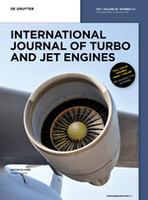
INTERNATIONAL JOURNAL OF TURBO & JET-ENGINES
Advancing the Future of Aerospace EngineeringINTERNATIONAL JOURNAL OF TURBO & JET-ENGINES, published by WALTER DE GRUYTER GMBH, is an esteemed academic journal dedicated to the field of aerospace engineering, specifically focusing on the innovative development and application of turbo and jet engine technologies. Established in 1985, this journal has maintained its commitment to advancing scholarly research and discussion, attracting contributions from leading experts across the globe. With a Scopus rank of #91 out of 153 in the field of Aerospace Engineering, placing it in the 40th percentile and categorized in Q3 for 2023, the journal provides a vital platform for disseminating high-quality research findings and insights into evolving engine technologies. Although it follows a subscription model, its rigorous peer-review process ensures that published articles contribute significantly to the body of knowledge in aerospace engineering and related disciplines. For researchers, professionals, and students alike, the INTERNATIONAL JOURNAL OF TURBO & JET-ENGINES stands as a crucial resource for staying updated on the latest advances and trends in turbojet and turbofan systems.
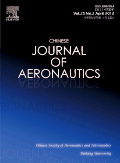
Chinese Journal of Aeronautics
Empowering global collaboration in aerospace innovation.Chinese Journal of Aeronautics, published by Elsevier Science Inc, serves as a premier platform for cutting-edge research in the field of aerospace and mechanical engineering. With an impressive impact factor that reflects its significant contribution to the discipline, this Open Access journal has been disseminated globally since 2002, allowing unrestricted access to high-quality articles and research findings. The journal is recognized for its exceptional ranking, holding a prestigious Q1 category in both Aerospace Engineering (Rank #8/153, 95th percentile) and Mechanical Engineering (Rank #46/672, 93rd percentile) as of 2023. It publishes original research, reviews, and technical notes that enhance our understanding of aeronautics and its applications, making it an essential resource for researchers, professionals, and students alike. Located in New York, USA, the journal continues to foster innovation and collaboration in aeronautical sciences, shaping the future of aviation and space exploration.
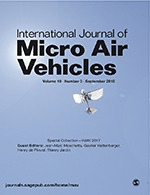
International Journal of Micro Air Vehicles
Unleashing Potential in Micro Air Vehicle DevelopmentThe International Journal of Micro Air Vehicles, published by SAGE Publications Ltd, stands as a pioneering platform for cutting-edge research in the rapidly evolving field of micro air vehicle (MAV) technology. With an ISSN of 1756-8293 and an E-ISSN of 1756-8307, this journal caters to a diverse readership, including aerospace engineers, researchers, and industry professionals who are at the forefront of innovation in aerospace engineering. It holds a commendable position within the Q3 category of Aerospace Engineering for 2023 and is ranked 65th out of 153 in Scopus, placing it in the 57th percentile among its peers. As a vital resource since its inception in 2010, the journal emphasizes advancements in design, performance, and applications of MAVs, while facilitating knowledge sharing and collaboration across disciplines. Although it operates on a subscription model, the journal ensures accessibility of pivotal research findings for professionals and scholars alike, aiming to shape the future of aerospace applications through rigorous academic inquiry.

Journal of Aerospace Technology and Management
Unlocking New Frontiers in Aerospace Knowledge.The Journal of Aerospace Technology and Management, published by the Instituto de Aeronáutica e Espaço (IAE), serves as a pivotal platform for the dissemination of innovative research in the fields of Aerospace Engineering and Computational Mechanics since its inception in 2009. With an ISSN of 1984-9648 and an E-ISSN of 2175-9146, this Open Access journal facilitates unrestricted access to quality research, fostering knowledge sharing and collaboration among researchers, professionals, and academic institutions worldwide. Based in Brazil, it ranks in the Q3 category according to the latest metrics (2023), highlighting its growing influence and relevance in the competitive landscape of aerospace studies. The journal currently boasts notable Scopus rankings, ensuring that published works achieve widespread recognition and impact within the scientific community. Its diverse scope encompasses a blend of theoretical and applied research, making it an indispensable resource for those seeking to explore groundbreaking advancements in aerospace technologies and management.
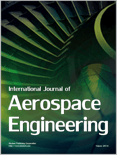
International Journal of Aerospace Engineering
Elevating Research, Transforming AerospaceThe International Journal of Aerospace Engineering, published by HINDAWI LTD, stands at the forefront of innovation and research in the field of aerospace engineering. With an impact factor reflecting its contributions to the discipline and classified in Quartile 3 (Q3) for the year 2023, this journal provides a platform for high-quality, peer-reviewed articles that delve into advancements and challenges in aerospace technology and applications. Since its inception in 2008, the journal has embraced an Open Access model, promoting unrestricted dissemination of research findings to foster collaboration and knowledge sharing among researchers, professionals, and academia. The journal covers a broad spectrum of topics, aiming to enhance understanding and give insight into aerospace engineering's multifaceted aspects. With its coverage in the Scopus database, ranking 71 out of 153 in the aerospace engineering category, the journal is a valuable resource for those engaged in this dynamic field, ensuring that high-impact research receives the visibility it deserves.

AEROSPACE AMERICA
Unveiling the Dynamics of Aerospace ProgressAerospace America, published by the American Institute of Aeronautics and Astronautics, stands as a crucial platform within the field of aerospace engineering. With over 30 years of dedication to advancing aerospace knowledge, the journal provides a comprehensive exploration of topics ranging from cutting-edge aerospace technology to aviation policy and industry developments. While it currently resides in the fourth quartile of the Scopus rankings for aerospace engineering, the journal aims to enhance its visibility and impact among researchers, professionals, and students. Access to its content is traditionally through institutional subscriptions, aligning with its mission to foster informed discussions and innovations in aerospace. As professionals and academics navigate the evolving landscape of aeronautics, Aerospace America remains a pivotal resource for those committed to the future of aerospace exploration and technology.
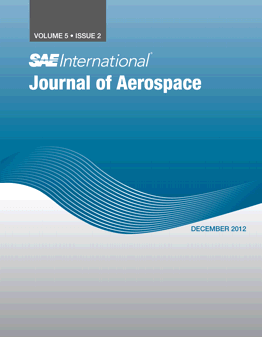
SAE International Journal of Aerospace
Bridging Theory and Practice in Aerospace.The SAE International Journal of Aerospace, published by SAE International, serves as a critical platform for innovative research and advancements within the field of aerospace engineering. With an ISSN of 1946-3855 and an E-ISSN of 1946-3901, this esteemed journal contributes significantly to the body of knowledge in the aerospace sector, boasting a convergence span from 2008 to 2024. While currently categorized in Q4 of Aerospace Engineering, the journal is dedicated to fostering emerging ideas, technologies, and methodologies that could eventually elevate its standing. Although it does not offer open access options, the journal ensures wide dissemination of its well-curated articles to aid researchers, professionals, and students in staying abreast of the latest developments and trends. Given its distinct focus and commitment to the aerospace community, the SAE International Journal of Aerospace plays an essential role in bridging theory and practice, making it a valuable resource for those within this vital and evolving field.

Aerospace Research in Bulgaria
Empowering researchers to propel aerospace forward.Aerospace Research in Bulgaria is a prestigious academic journal dedicated to advancing the field of aerospace engineering and technology. Published by the BULGARIAN ACADEMY OF SCIENCES, SPACE RESEARCH & TECHNOLOGY INSTITUTE (SRTI-BAS), this journal serves as a key platform for researchers, engineers, and professionals seeking to share original research, innovative technologies, and critical reviews related to aerospace applications. With the ISSN 1313-0927 and E-ISSN 2367-9522, the journal aims to contribute significantly to the global aerospace community. Although the journal operates under a traditional access model, it emphasizes the importance of research collaboration and disseminating knowledge in the ever-evolving aerospace sector. The editorial team is committed to maintaining high standards in peer review, making it an essential resource for academics and practitioners alike. Located at ACAD. GEORGI BONCHEV STR., SOFIA 1113, BULGARIA, this journal not only highlights Bulgarian contributions to aerospace research but also aims to engage with a broader international audience, fostering advances that propel the industry forward.